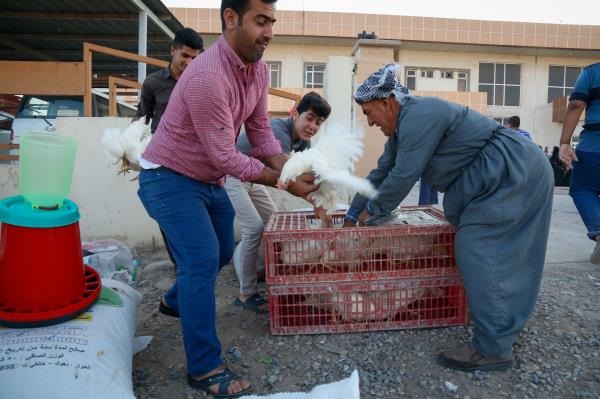
20 June 2017, Erbil, Iraq - Thousands of vulnerable Iraqis and Syrian refugees will profit from new agricultural livelihoods ventures thanks to a Food and Agriculture Organization of the United Nations (FAO) project supporting families affected by conflict in northern Iraq.
The project, funded by Germany and operating in the Erbil and Dohuk governorates, will train Syrian refugees in greenhouse vegetable cultivation, and support Iraqi families with hens for egg production and meat, and training and tools for bee-keeping and food processing.
Years of conflict in Iraq has left 3.2 million people food insecure, including those who depend on agriculture for their livelihoods. More than 3 million Iraqis remain displaced, putting pressure on the stretched resources of host communities. Another 240 000 Syrian refugees live in Iraq, 97 percent of whom are staying in communities or camps in northern Iraq.
"Families are struggling, some resorting to reducing their meal sizes or the number of meals each day, selling productive assets, or buying food on credit," said Fadel El-Zubi, FAO Representative in Iraq. "Through restoring and providing alternative livelihoods, this project will support government efforts to reduce long-term dependence on emergency food assistance and enable people to recover as quickly as possible."
During the first week of June 2017, 2 400 people from 150 villages received 9 600 hens, poultry feeding and drinking equipment, and 80 tonnes of feed. The recipients were either displaced by conflict or residents of areas where displaced people or refugees were living.
Over the course of a year, the hens will produce approximately 1.38 million eggs and 1 200 kilograms of meat, providing food for families and income from the sale of surplus eggs. Each family received 23 hens, which will together produce around 3 450 eggs and 30 kilograms of meat in a year.
Another 2 400 people will receive training, tools and equipment for bee-keeping for honey production, and dairy and fruit processing, to produce a variety of dairy products, fruit jams and dried fruit for sale.
Some 3 000 Syrian refugees in Qushtapa camp in Erbil governorate and Domiz 1 camp in Dohuk governorate will receive training in greenhouse vegetable production. In ten greenhouses at each camp, participants will initially focus on growing tomatoes and cucumbers, due to high market demand. The income from vegetable sales will enable families to buy extra food and other necessities. Camp residents and people from surrounding communities will be able to purchase greenhouse produce during two vegetable seasons each year.
The USD 1.6 million project is funded by the German Federal Ministry for Economic Cooperation and Development (BMZ), through the Deutsche Gesellschaft für Internationale Zusammenarbeit (GIZ) GmbH.